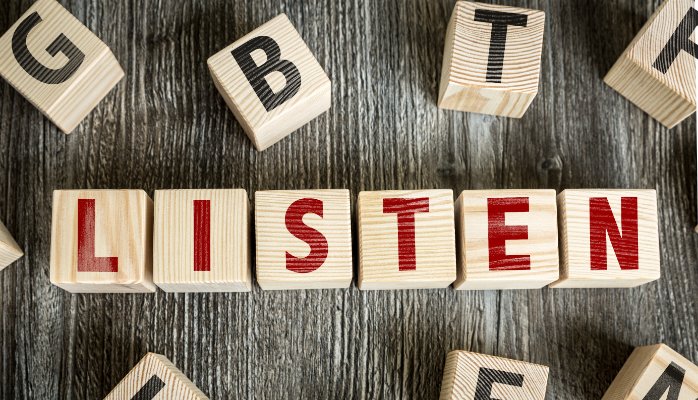
01 Jun You can’t be a great leader without being a great listener
A wise person once said, “speak in such a way that others love to listen to you, listen in such a way that others love to speak to you”.
It’s a lesson that is particularly valuable for the current generation of leaders, especially as there are more distractions than ever that get in the way of listening correctly. Arguably, leadership finds its source in understanding people – which suggests that understanding people precedes leading them, and people who push an agenda without understanding the wider context of the conversation risk missing the point.
Put simply, leaders are often too occupied with being in charge or thinking about the next step to really listen properly. So, what’s the link between being a good listener and a great leader?
Why leaders struggle to be good listeners
Leaders are essential to the success of a business. However, going into every conversation knowing how important they are is the wrong attitude, and means they have already compromised the value of the interaction. Leaders should guard against hubris that may well deprive them from learning something new. Too many leaders undervalue what people are saying to them and overvalue their own take on things.
Common listening mistakes leaders make
Leaders often make an error before they even start conversations. Many are tempted to listen with the intent to respond, rather than a drive to understand what people are talking about. They’re so focussed on being a leader that they miss the true context of these interactions.
In addition to listening to the words people say, they need to be aware of what is not said, especially when they’re seeking someone’s input or feedback on a decision. It’s the same when someone comes to them for help. Without being aware of where they’re coming from or why they’re raising a particular issue, listeners won’t be able to fully understand exactly what is being said.
One common mistake involves forgetting there is a difference between hearing what someone is saying and actually listening to him or her. Listening means you are taking their point of view into account and truly considering what they have to say. Instead, many leaders simply hear what they want to hear and respond as they see fit.
Leaders let distractions get in the way of listening properly
To be fair to leaders, today’s world is filled with innumerable distractions that make it much harder for people to listen in any context. Interestingly, these distractions can result in either under- or over-engagement. For every person checking emails during meetings or trying to listen to multiple channels at once, there’s someone else living within their noise-cancelling headphones and not fully engaging with anyone.
The way we’re living within this world of distractions is conspiring against valuable conversations and making it harder to listen properly and develop these skills. Instead of having time to slow down and take time with each interaction, leaders are bombarded with conversations of various natures, from digital to face-to-face.
To combat this, leaders need to make an effort to leave their digital or noise-cancelling headphone worlds and actively engage with the people who need it most. A leader’s role involves engaging with more than those approaching them with something to say – they must also take the time to seek out and listen to people at every level in the organisation to learn and build trust and improve the business.
Leaders need to test themselves on whether or not they’re a good listener as well, as people can’t assume that they are. For example, each time you have a new conversation, test yourself afterwards. Can you remember the person’s name, why they came to you and what they do?
Learning how to be a better listener can help you become a more effective leader – but first you need to decide to develop an attitude of wanting to listen. As Will Rogers said, “Never miss a good chance to shut up.”
This article was originally published in LinkedIn Pulse on June 1, 2016.

No Comments